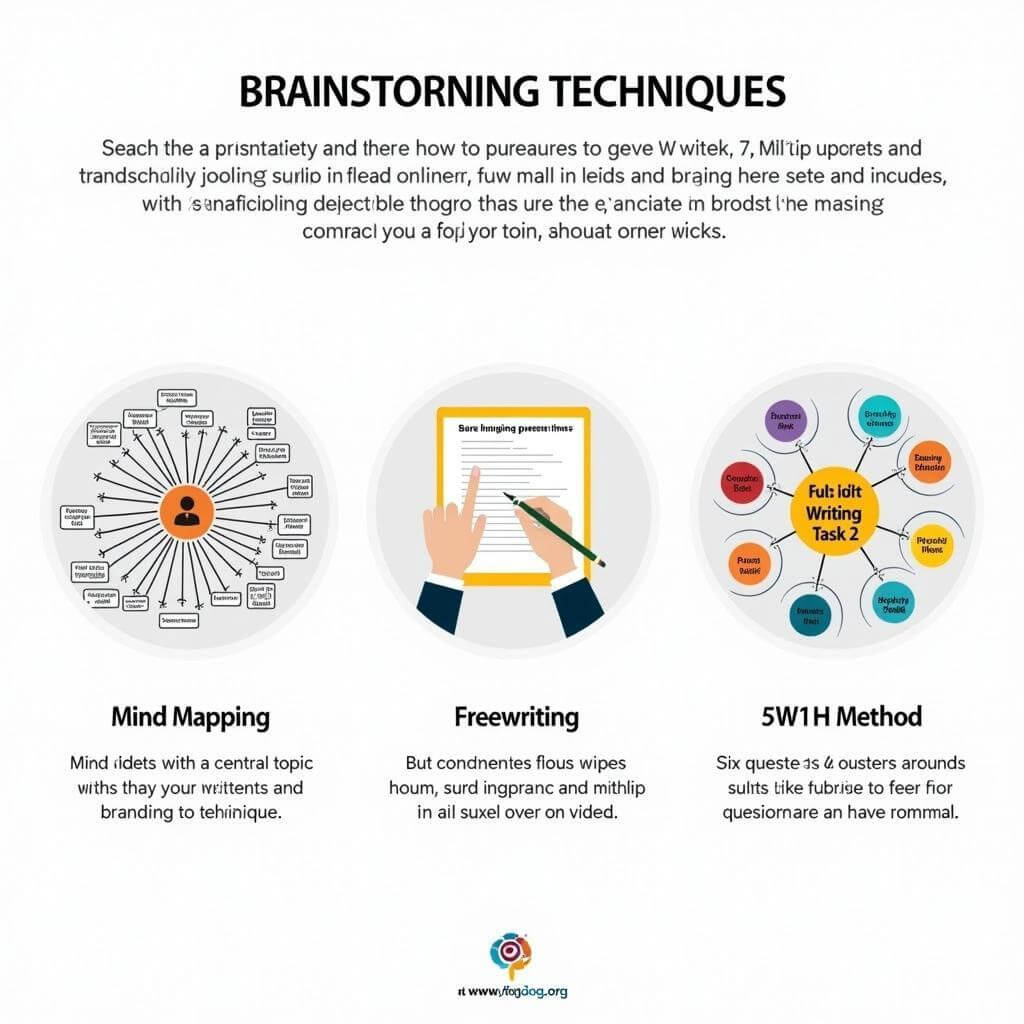IELTS Writing Task 2 often poses a challenge for test-takers, particularly when it comes to generating and developing ideas. This comprehensive guide will explore proven strategies on how to develop ideas for Task 2, helping you craft well-structured and compelling essays that impress examiners and boost your band score.
Understanding the Importance of Idea Development
Before diving into specific techniques, it’s crucial to recognize why idea development is a cornerstone of IELTS Writing Task 2 success. A well-developed essay demonstrates your ability to think critically, analyze complex issues, and express your thoughts coherently in English.
Dr. Emma Thompson, a renowned IELTS expert with over 15 years of experience, emphasizes:
“The ability to generate and expand on ideas is what separates average writers from those who excel in IELTS Task 2. It’s not just about having an opinion, but about supporting it with logical reasoning and relevant examples.”
Strategies for Effective Idea Generation
1. Brainstorming Techniques
Brainstorming is an essential first step in developing ideas for your essay. Here are some effective techniques:
- Mind Mapping: Create a visual representation of your thoughts by drawing branches from the main topic.
- Freewriting: Write continuously for 2-3 minutes without stopping, allowing your ideas to flow freely.
- The 5W1H Method: Ask yourself Who, What, When, Where, Why, and How questions related to the topic.

2. Analyzing the Question
Careful analysis of the Task 2 question is crucial for developing relevant ideas. Follow these steps:
- Identify the topic and scope
- Determine the task type (agree/disagree, discuss both views, etc.)
- Highlight key words and phrases
- Break down the question into smaller parts if necessary
3. Drawing from Personal Experience
Personal experiences can provide valuable material for your essay. Consider:
- Relevant situations from your own life
- Experiences of friends or family members
- News stories or current events you’re familiar with
Expanding and Developing Your Ideas
Once you have generated initial ideas, the next step is to expand and develop them into full-fledged paragraphs. Here are some strategies to help you:
1. The PEEL Paragraph Structure
PEEL stands for Point, Explanation, Example, and Link. This structure helps you develop your ideas logically:
- Point: State your main idea or argument
- Explanation: Elaborate on your point
- Example: Provide a specific example to support your explanation
- Link: Connect back to the main topic or transition to the next paragraph
2. Using the “Why? How? What if?” Technique
To deepen your analysis, ask yourself these questions:
- Why is this important?
- How does this impact society/individuals?
- What if the opposite were true?
This technique helps you explore different angles and add depth to your arguments.
3. Incorporating Evidence and Examples
Supporting your ideas with concrete evidence and examples is crucial. Consider using:
- Statistics and data from reputable sources
- Historical events or trends
- Case studies or real-life scenarios
Remember to explain how your evidence relates to your argument, don’t just state facts.
Overcoming Common Challenges
Developing ideas for IELTS Writing Task 2 can be daunting, but awareness of common pitfalls can help you avoid them:
1. Writer’s Block
If you’re struggling to generate ideas, try:
- Changing your perspective on the topic
- Taking a short break to clear your mind
- Discussing the topic with others (in a non-exam setting)
2. Lack of Specific Knowledge
Don’t worry if you’re not an expert on the essay topic. Focus on:
- General knowledge and common sense
- Logical reasoning and analysis
- Hypothetical scenarios to illustrate your points
3. Time Management
Balancing idea generation with writing time can be challenging. Practice:
- Quick brainstorming techniques
- Outlining your essay structure before writing
- Allocating specific time for planning (e.g., 5 minutes)
For more strategies on time management and planning, check out our guide on strategies for developing task 2 ideas.
Practicing and Refining Your Skills
Developing ideas effectively for IELTS Writing Task 2 is a skill that improves with practice. Here are some ways to refine your abilities:
- Regular writing practice with timed conditions
- Analyzing sample essays to understand effective idea development
- Seeking feedback from teachers or peers
- Expanding your general knowledge through reading and discussions
Remember, the key to success in IELTS Writing Task 2 is not just having ideas, but presenting them in a clear, coherent, and well-supported manner.
As IELTS expert Dr. Sarah Lee notes:
“The best IELTS essays demonstrate not just language proficiency, but the ability to think critically and express complex ideas clearly. Consistent practice in idea development is crucial for achieving this level of writing skill.”
For more in-depth guidance on developing your IELTS Writing Task 2 skills, explore our comprehensive resources on how to develop ideas for IELTS writing task 2.
Conclusion
Mastering the art of idea development for IELTS Writing Task 2 is a journey that requires patience, practice, and perseverance. By implementing the strategies outlined in this guide, you’ll be well-equipped to generate, expand, and articulate your ideas effectively. Remember, the goal is not just to fill the page, but to craft a compelling, well-reasoned essay that showcases your English language skills and critical thinking abilities.
As you continue to refine your approach to IELTS Writing Task 2, don’t forget to explore other aspects of the IELTS exam. For instance, our guide on writing complex task 1 descriptions can help you improve your skills across different writing tasks.
With consistent practice and the right strategies, you’ll be well on your way to achieving your desired band score in IELTS Writing Task 2. Keep developing those ideas, and watch your confidence and performance soar!